Front Game Rules (Non-family versions)
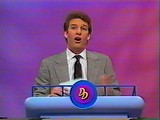 Marc Summers gave the rules better than I ever will: Marc Summers gave the rules better than I ever will:
"I'm going to ask you a question, and if you don't know the answer or think the other team hasn't got a clue, you can Dare them to answer it for double the dollars. But, be careful, because they can always Double Dare you back for four times the amount, and then you either have to answer the question or take the Physical Challenge."
|
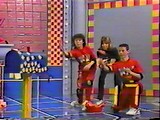 Each round began with both teams (of two kids) taking part in a toss-up challenge. The first team to complete it won $20 in Round One or $40 in Round Two and received control of the game. Summers would then ask a question worth $10/$20. The team could Dare their opponents to answer for $20/$40, at which point the other team could Double Dare for $40/$80. If the team didn't know the answer, they would have to take a Physical Challenge also worth $40/$80. An incorrect answer meant that the other team got control (and on a Dare or Double Dare, they got the money too). After two rounds of play, whoever had the most money won the game.
Each round began with both teams (of two kids) taking part in a toss-up challenge. The first team to complete it won $20 in Round One or $40 in Round Two and received control of the game. Summers would then ask a question worth $10/$20. The team could Dare their opponents to answer for $20/$40, at which point the other team could Double Dare for $40/$80. If the team didn't know the answer, they would have to take a Physical Challenge also worth $40/$80. An incorrect answer meant that the other team got control (and on a Dare or Double Dare, they got the money too). After two rounds of play, whoever had the most money won the game.
|
Front Game Rules (Family Double Dare/DD 2000)
|
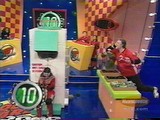 Two families of four competed. Dollar values were $25/$50 first off, $50/$100 on a Dare and $100/$200 on a Double Dare or Physical Challenge. Round One Challenges used two family members while Round Two Challenges used all four. In the current version, a family can take the "Triple Dare Challenge" which makes the Challenge tougher. If successful, the family won $300 and a bonus prize; otherwise it went to the other team. Two families of four competed. Dollar values were $25/$50 first off, $50/$100 on a Dare and $100/$200 on a Double Dare or Physical Challenge. Round One Challenges used two family members while Round Two Challenges used all four. In the current version, a family can take the "Triple Dare Challenge" which makes the Challenge tougher. If successful, the family won $300 and a bonus prize; otherwise it went to the other team.
|
End Game Rules (All versions)
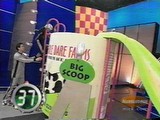 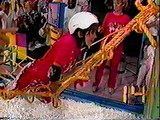 The winning team took part in an 8-stage obstacle course (often dubbed as the "messiest minute on television"). Each team member alternated duties, and the team had 60 seconds to clear as many obstacles as possible. For each obstacle, a flag had to be retrieved and passed along to the next teammate. Each flag that was picked up won a prize, increasing in value as the course went along. The eighth flag won the grand prize, usually a trip or (in the FOX family version) a car. The winning team took part in an 8-stage obstacle course (often dubbed as the "messiest minute on television"). Each team member alternated duties, and the team had 60 seconds to clear as many obstacles as possible. For each obstacle, a flag had to be retrieved and passed along to the next teammate. Each flag that was picked up won a prize, increasing in value as the course went along. The eighth flag won the grand prize, usually a trip or (in the FOX family version) a car.
|
Notes
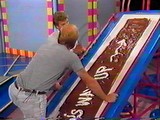 Among the most famous obstacles during the show's 15-year history is the "One-Ton Human Hamster Wheel," in which one player ran up a wheel to try and bring down a boxing glove which held the flag; "The Wringer", in which one player jumped through a pair of rollers and down a ramp (often coated with some messy substance referred to as "Gak"); and the dreaded "Sundae Slide", where a player tried to climb up a ramp coated with chocolate syrup and then down a slide into more Gak. The Sundae Slide often accounted for the demise of many Obstacle Course campaigns; as Summers put it in a home video about the show: "Once your foot gets into the chocolate pudding, you're dead meat." Among the most famous obstacles during the show's 15-year history is the "One-Ton Human Hamster Wheel," in which one player ran up a wheel to try and bring down a boxing glove which held the flag; "The Wringer", in which one player jumped through a pair of rollers and down a ramp (often coated with some messy substance referred to as "Gak"); and the dreaded "Sundae Slide", where a player tried to climb up a ramp coated with chocolate syrup and then down a slide into more Gak. The Sundae Slide often accounted for the demise of many Obstacle Course campaigns; as Summers put it in a home video about the show: "Once your foot gets into the chocolate pudding, you're dead meat."
In a twist of irony, Marc Summers, host of one of the messiest shows in television, is afflicted with Obsessive-Compulsive Disorder. Summers gives speeches across the country on how to cope with this condition.
In FDD's final year, the show had a Tournament of Champions, which pitted a team of "Brains" (the team who answered the most questions during the front game) against one of "Brawn" (the family with the fastest Obstacle Course time).
|
This show deserves the title of "classic" simply because it stayed on for such a long period of time. Kids' game shows are kinda tricky to pull off, because in order to keep the same number of people watching, you're always having to bring people in as older kids grow out of the show. Adding a Family concept to the show was a mixed blessing; it opened the door to better prizes and added more of a family feel to the show, but it also slowed down the gameplay. Marc Summers is a terrific host; he never acted like some fake hip-dude like J.D. Roth or Phil Moore, but then again he didn't have to. And the Obstacle Course has got to be one of the greatest endgames in the genre. The rotation of obstacles gave the show a TPIR-like variety, and it got quite exciting when a team reached that last obstacle with 6 seconds to go. I can only hope that the current version doesn't fall prey to the next potboiler Klasky-Csupo dreams up.